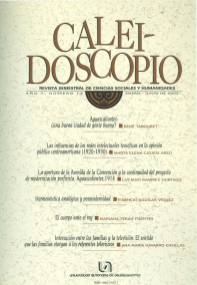The influences of the theosophical intellectual nets in the public opinion of Central America (1920-1930)
DOI:
https://doi.org/10.33064/13crscsh411Keywords:
teosofía, centroamerica, liberalismo, positivismoAbstract
This work deals with the role of the cultural, spiritualistic, and theosophical societies in the end of the XIX century and beginning of the XX in Central Arnerica as new forrns of legitirnacy of the civil society, and how they represented the starting of a new forrn of thinking and a proposal of national construction. Theosophy, nourished by Hinduisrn, Neoplatonisrn, Krausism, Arielism, and Fabian socialism, searched for the restatement of an idea of nation based on the equality of races and genders, the moral regeneration of society by means of education and the construction of an identity recovering the ancestral cultures. The article shows the way of thinking and acting of two great Central American thinkers that belong to this movement Alberto Masferrer, who searches for the construction of a real, positive, and authentic nation from a vitalist position; and Carlos Wyld Ospina, who strongly criticises the tyranny ("caudillismo") and imperialism as factors that prevent the shaping of an authentic nationality.
Downloads
Downloads
Published
How to Cite
Issue
Section
License
Licencia Creative Commons Atribución-NoComercial-CompartirIgual 4.0 Internacional
El lector es libre de compartir o adaptar el material en cualquier medio o formato bajo las condiciones siguientes: (a) debe reconocer adecuadamente la autoría, proporcionar un enlace a la licencia e indicar si se han realizado cambios; (b) no puede utilizar el material para una finalidad comercial y (c) si remezcla, transforma o crea a partir del material, deberá difundir sus contribuciones bajo la misma licencia que el original.
Resumen de la licencia
https://creativecommons.org/licenses/by-nc-sa/4.0/deed.es_ES
Texto completo de la licencia
https://creativecommons.org/licenses/by-nc-sa/4.0/legalcode
Cada autor es responsable del contenido de su artículo. En el caso de un texto colectivo, el primer autor asume la responsabilidad intelectual de los resultados del proceso editorial; los autores son responsables de obtener la licencia de autor para reproducir materiales gráficos o fotográficos que pertenecen a terceros.
Los autores asumen plena responsabilidad en el caso de falsificación de datos o falta de autenticidad en la investigación. Se comprometen, también, a no reutilizar trabajos ya publicados, total o parcialmente, para presentarlos en otra publicación.
Estas condiciones aplican tanto a la versión impresa como a la versión electrónica de la revista.


















